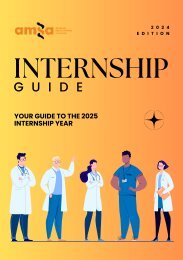Vector Volume 11 Issue 1 - 2017
Create successful ePaper yourself
Turn your PDF publications into a flip-book with our unique Google optimized e-Paper software.
Beyond the horizon and back again<br />
Interview with Professor David Hilmers<br />
[Feature Article]<br />
Ashley Wilson-Smith<br />
Prelude<br />
The globalisation of medicine, particularly<br />
within the last 50 years, has presented both<br />
students and practitioners with an exciting -<br />
yet staggering - amount of career and lifestyle<br />
pathways. Be it working with Medecins Sans<br />
Frontieres (MSF) in Africa; coordinating a WHO<br />
response to a new, virulent disease; or servicing<br />
rural-remote populations in outback Australia;<br />
the variety of work within medicine is nothing<br />
short of astounding.<br />
Early life and background<br />
Speaking with Professor David Hilmers of<br />
the Baylor College of Medicine, this becomes<br />
abundantly clear. With rich and varied<br />
occupational and academic experience,<br />
Hilmers’ pathway into medicine is as fascinating<br />
as his career has been since graduation. After<br />
growing up in a small town in Iowa, Hilmers<br />
moved from undergraduate study to flight<br />
school, the United States Marines – during the<br />
Vietnam War, no less – and eventually graduate<br />
school. Here, he studied electrical engineering<br />
and mathematics, giving him a tremendous<br />
grounding in scientific practice. Whilst he<br />
expressed a desire to practice medicine<br />
from as early as childhood, Hilmers was<br />
serendipitously given opportunities that initially<br />
drove him more towards working with N.A.S.A<br />
than working in medicine, as astounding as<br />
that may seem. Contextually, the United States<br />
space program was still maturing following<br />
the peak of the Cold War, with Hilmers’ career<br />
progression perfectly aligning with the 1980’s<br />
selection period.<br />
In space on IML-1 just before starting medical school<br />
Moving into N.A.S.A (and eventually,<br />
medicine)<br />
Whilst stationed in Japan on his third tour<br />
overseas, Hilmers heard that the Marines were<br />
offering forward candidates for consideration<br />
to the astronaut program. Given that his<br />
background was textbook in terms of the<br />
desired skillsets - flight/military experience,<br />
engineering and mathematics - he placed<br />
himself forward. One level after another, he<br />
cleared selection and eventually found himself<br />
as an astronaut-in-training, something which<br />
he considered entirely surprising. After a period<br />
of intense long-term preparation, training and<br />
eventually four on-orbit expeditions later,<br />
Hilmers decided that it was finally time to study<br />
medicine. Whilst it would have been incredible<br />
to hear more about this journey to N.A.S.A,<br />
it is his work following his time in space that<br />
really exemplifies the multifaceted nature of<br />
medicine and global health.<br />
26

















